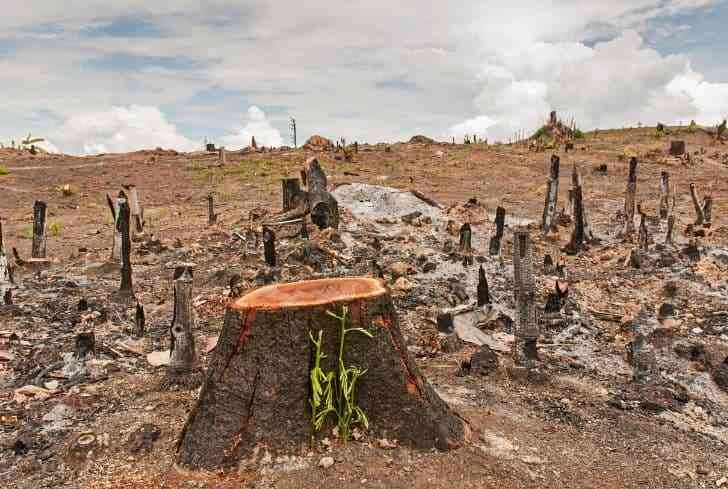
The African Wildlife Foundation (AWF) is striving to help communities to arrest deforestation in tobacco producing areas through climate adaptation projects.
During the tobacco season, Zimbabwe earned over US$1 billion in foreign currency but it has had major effects, particularly deforestation caused by curing of the golden leaf.
In a move aimed at halting forest depletion, AWF embarked on smart agriculture that reduces deforestation through UTARIRI project, an Integrated and Adaptive Biodiversity, Climate and Livelihoods Project in the Zambezi Valley
The UTARIRI project is being implemented in the Zambezi Valley, covering Hurungwe and Nyaminyami districts in Mashonaland West province, Mbire and Muzarabani within Mashonaland Central province.
The Zambezi Valley falls within the United Nations’ Intergovernmental Panel on Climate Change Regional Climate Model 1.
AWF country director Olivia Mufute, said the overarching goals of the initiative were centred on contributing to the sustainable management and utilisation of natural resources, biodiversity restoration, climate action, and enhancement of community resilience within the Zambezi Valley.
‘‘The region also experiences frequent wildfires due to increased droughts among other factors that have increased substantially yearly,’’ said Mufute.
Over 400 000 hectares were lost to fires in 2021, an 85% increase compared to 2020.
- Over 400 nabbed for environmental violations
- Over 400 nabbed for environmental violations
- Rising charcoal demand threatens Mat North forests
- AWF and Nature's Best Photography award winners announced
Keep Reading
‘‘AWF provided technical and funding support for small-scale tobacco farmers from Hurungwe district to reduce the impact of deforestation through the project partnership for improved anti-poaching and compatible land use in community lands of lower Zambezi-Mana Pools transboundary conservation area,” she added.
The project was funded by the European Union from 2018 to 2021.
Mufute said some of the challenges faced in the area included conversion of land for agriculture and deforestation, reducing the habitat available for wildlife and contributing to an increase of human-wildlife conflict.
‘‘Some of the initiatives to address deforestation included implementation of initiatives by communities such as the planting of trees, construction of new fuel-efficient tobacco curing barns such as rocket barns and the reconstructing or rehabilitation of the traditional tobacco barns to become more fuel-efficient,’’ Mufute said.
Under the EU-funded project (2018 to 2021), AWF partnered other local civic groups that identified models for mainstreaming environmental practices into tobacco farming.
They focused on energy-related initiatives that reduce the need to collect large quantities of fuel-wood used in tobacco curing.
‘‘The project was piloted in some rural wards in Hurungwe district adjacent to the buffer zone of protected areas as an effort to assist in improving community and small-scale farmer livelihoods by creating energy efficiencies for the small-holder farmers,” she said.
‘‘This also prevented further conversion of habitat through deforestation for both fuel-wood and agricultural expansion as a result of the need for additional land for tobacco cultivation.”
Small-holder farmers and local communities established stands of fast-growing woody plants that could be used in tobacco curing and these included both indigenous and exotic tree species.
This initiative was established and promoted through the private sector and other partnerships.
The project convened buyers and small-holder farmers to help catalyse changes in tobacco production that put less pressure on forests by adopting successful and more efficient tobacco curing techniques, she said.
Hurungwe rural district ward 7 councillor Nomatter Murisi confirmed that the project has helped in maintaining forests in communities.
‘‘Our local communities are reviving the forests through the initiative of reducing the cutting of trees to cure tobacco. We are grateful smart agriculture is a balancing act on maintaining nature and sustainable development,’’ he explained.
Mufute explained that there is regular monitoring on the use of the pilot rocket barns.
‘‘These helped on lessons learnt and reports documenting the results were shared to encourage adoption by the small-holder farmers,’’ she said.
Community wildlife scouts trained under the same project respond effectively to the human and wildlife conflict caused by climate change.
“The scouts employ non-lethal deterrents and raise awareness of biodiversity conservation, and they are well-equipped to combat wildfires, protecting over 600 hectares of crop fields,” Mufute added.
One hundred and fifty-nine nations (about 80% of world land) signed the COP28 UAE declaration on sustainable agriculture, resilient food systems and climate action thereby committing to integrating food systems in 2025.










